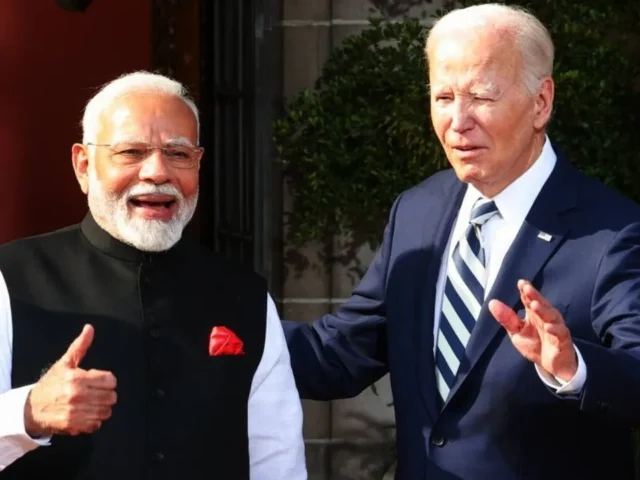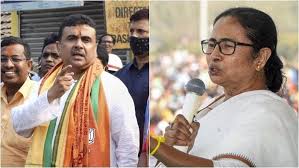Calcutta Lands US Semi-Conductor Deal

<News Services>
US President Joe Biden and Prime Minister Narendra Modi on Saturday hailed a watershed arrangement to establish a new semiconductor fabrication plant focused on advanced sensing, communication, and power electronics for national security, next generation telecommunications, and green energy applications.
The plant, which will be established with the objective of manufacturing infrared, gallium nitride and silicon carbide semiconductors, will be enabled by support from the India Semiconductor Mission as well as a strategic technology partnership between Bharat Semi, 3rdiTech, and the U.S. Space Force.
The ‘Joint Fact Sheet: The United States and India Continue to Expand Comprehensive and Global Strategic Partnership’ released by White House after a meeting between PM Modi and US President noted the launch of a new US-India Advanced Materials R&D Forum to expand collaboration between American and Indian universities, national laboratories, and private sector researchers.
The Leaders also highlighted additional cooperation being built across artificial intelligence (AI), quantum, and other critical technology areas.
They praised combined efforts to facilitate resilient, secure, and sustainable semiconductor supply chains including through GlobalFoundries’ (GF) creation of the GF Kolkata Power Center in Kolkata, India that will enhance mutually beneficial linkages in research and development in chip manufacturing and enable game-changing advances for zero and low emission as well as connected vehicles, internet of things devices, AI, and data centres.
They noted GF’s plans to explore longer term, cross-border manufacturing and technology partnerships with India which will deliver high-quality jobs in both of our countries.
They also celebrated the new strategic partnership between the US Department of State and the India Semiconductor Mission, Ministry of Electronics and Information Technology in connection with the International Technology Security and Innovation (ITSI) Fund.
“The Leaders welcomed steps our industry is taking to build safe, secure, and resilient supply chains for US, Indian, and international automotive markets, including through Ford Motor Company’s submission of a Letter of Intent to utilize its Chennai plant to manufacture for export to global markets,” the Fact Sheet said.
The Leaders welcomed progress toward the first joint effort by NASA and ISRO to conduct scientific research onboard the International Space Station in 2025. They appreciated the initiatives and exchange of ideas under the Civil Space Joint Working Group and expressed hope that its next meeting in early 2025 will open additional avenues of cooperation.
“They pledged to pursue opportunities to deepen joint innovation and strategic collaborations, including by exploring new platforms in civil and commercial space domains,” it said.
PM Modi and President Biden welcomed efforts to enhance collaboration between research and development ecosystems of the two countries.
“They plan to mobilize up to over USD 90 million in US and Indian government funding over the next five years for the U.S.-India Global Challenges Institute to support high-impact R&D partnerships between U.S. and Indian universities and research institutions, including through identifying options to implement the Statement of Intent signed at the June 2024 iCET meeting.”
The Leaders also welcomed the launch of a new U.S.-India Advanced Materials R&D Forum to expand collaboration between American and Indian universities, national laboratories, and private sector researchers.
The two leaders announced the selection of 11 funding awards between the National Science Foundation and India’s Department of Science and Technology, supported by a combined over USD 5 million grant to enable joint US-India research projects in areas such as next-generation telecommunications, connected vehicles, machine learning.
The Leaders announced the award of 12 funding awards under the National Science Foundation and Ministry of Electronics and Information Technology, research collaboration with a combined outlay of nearly USD 10 million to enable joint U.S.-India basic and applied research in the areas of semiconductors, next generation communication systems, sustainability & green technologies and intelligent transportation systems.
NSF and MeitY are exploring new opportunities for research collaboration to enhance and synergize the basic and applied research ecosystem on both sides.

While CM, Mamata Banerjee (right) highlighted the role of the state in landing the contract, Opposition Leader, Adhikary (left) lauded the Prime. Minister for his leadership in steering the plant to Calcutta
West Bengal Chief Minister, Banerjee lauded the development on X (formerly Twitter) on Monday: “I am fortunate enough to share with you all the contribution of our West Bengal government in the historic international investment decision for Kolkata, as kindly announced by Hon’ble President of the USA with our Hon’ble PM Modi yesterday. The background story of our long and arduous exercises which lie behind the great news about a major American investment in our State in the semiconductor sector is truly worth sharing.”
Leader of the Opposition in the state and the Prime Minister’s colleague in the BJP party, Suvendu Adhikary also took to X, saying: “I would like to express my sincere gratitudes to Hon’ble Prime Minister Shri @narendramodi Ji for the landmark arrangement to establish a new advanced Semiconductor Fabrication Plant in Kolkata during his meeting with US President Joe Biden.”
Adhikary added, “The new strategic partnership between the US Department of State and the India Semiconductor Mission, the Ministry of Electronics and Information Technology (MeitY) in connection with the International Technology Security and Innovation (ITSI) Fund will create high-quality jobs in both the countries. I sincerely hope that West Bengal will grab this opportunity with both hands which may lay the foundation for a turn around for the State which is reeling under the worst economic crisis in its history under the Mamata regime.”
 The Global Calcuttan Magazine
The Global Calcuttan Magazine